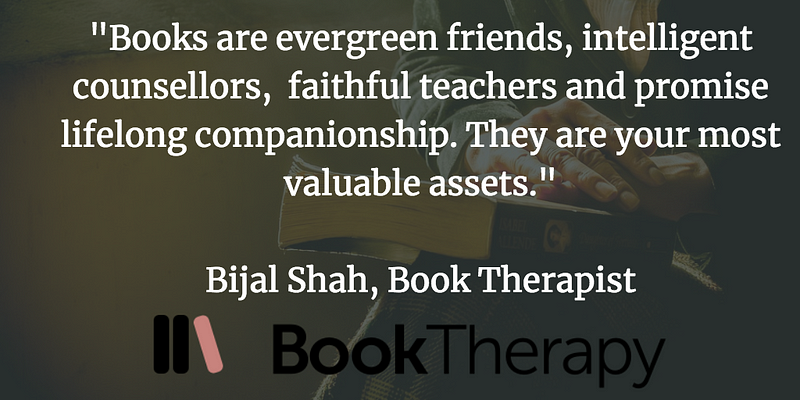Why Literary Fiction is My Favourite Form of Therapy
Posted by Bijal Shah on

When we read a great fiction book — we experience a certain sense of joy, happiness or satisfaction. Beyond reading a great story it is often the striking connection we feel to the characters and the fact that the book resonates with us. All the elements of story telling have hit the right buttons deep within us and released a whole dose of serotonin that allows us to experience a feel-good moment.
That feel-good moment comprises a sense of belonging and being part of a greater story, where we momentarily escape from the challenges and hardships of our own life.
And the reason why fiction is so great? It’s better than the real world — it allows us to use our imagination and access aspects of our unconscious that we would never be able to tap into otherwise. These illuminating moments through the use of words stringed together can sometimes be more powerful than any psychotherapy conducted by a psychoanalyst.
In addition, group bibliotherapy or reading in groups (similar to book clubs) can be even more powerful as ideas are shared, social connections are fulfilled, social networks built, a sense of belonging is established — all things that hugely boost and optimise our self-esteem, our self-confidence and leave us feeling energised and refreshed. It solves the pain caused by loneliness which is becoming an epidemic, particularly amongst older generations.

Our connection with fictional characters recreates enjoyable moments of friendship as though we just shared a wonderful experience together and we wish we could meet them in real life. The level of intimacy experienced is sometimes greater than with a close family member or friend due to the open and transparent nature of the narrative and the fact that we have uninterrupted access into the mind and emotions of the characters.
For example, Anne Elliot’s character in Jane Austen’s lesser known “Persuasion” resonates with us when we look back at times in our lives where we have experienced pain or suffering.
“The last few hours were certainly very painful,” replied Anne, “but when pain is over, the remembrance of it often becomes a pleasure. One does not love a place the less for having suffered in it, unless it has been all suffering, nothing but suffering”
Austen’s in-depth account of Anne’s suffering and heart-break in the book, conveys an experience of suffering that readily resonates with a reader who has been through a similar experience. On the flip side if the reader has never experienced such feelings of pain and suffering, the reader is enlightened through vicariously experiencing these feelings through the imaginative writing of the author.
In a similar vein, George Orwell’s Animal Farm and Margaret Atwood’s The Handmaid’s Tale offer solace, echoing the horrors of a person who has experienced injustice or cruelty at the hands of society as we have seen with the holocaust or modern day genocides or the Syrian refugee crisis being recent, extreme examples of dystopian cultures and environments. These books also allow the wider public to ‘virtually’ experience another person’s reality through empathetic reading so that these readers too can support and help the victims of such horrifying events, potentially contributing to public policy initiatives to prevent such human rights abuses in the future.
This sort of empathy also extends to the darker side of the human experience — we may find ourselves empathising with a murderer realising that sometimes events play out in strange ways — for example William Golding’s Lord of the Flies is a haunting tale of how in an attempt to govern themselves, things go harrowingly wrong for a group of British boys stranded on an uninhabited island leading to an unexpected murder. The book explores the dark side of human nature and our capacity for corruption and harm in order to survive. It leads us to the question that if we were in a similar situation, would events have played out in a similar fashion?
In my time as a book therapist, I have observed the following: the practice of reading whilst entertaining serves as a cost-effective form of therapy. It is also educational, expanding our knowledge and experience of the world, connecting us with people that we would not otherwise connect with be they fictional or real, extending our empathetic capabilities, and safely submerging us into a imaginative virtual reality that is better than that created by any technology.
What’s your favourite fiction book that’s been a lifeline for you during a tough time? Please do share down below in the comments section!
A big hello and thank you for reading! Passionate about literature, psychology, life and mental health I launched Book Therapy as a form of non-conventional therapy using the power of literature. I create reading lists/book prescriptions based on your individual needs. Feel free to reach out to me at bijal@booktherapy.io or www.booktherapy.io. You can also check out Book Therapy’s other free reading lists and book prescriptions.
If you enjoyed reading this article, subscribe to the blog.
Book Therapy is a participant in the Amazon EU, US and Canada Associates Programme, an affiliate advertising programme designed to provide a means for sites to earn advertising fees by advertising and linking to Amazon.co.uk, Amazon.com and Amazon.ca
Share this post
- 0 comment
- Tags: benefits of book therapy, bibliotherapy, literary fiction, why book therapy, why everyone needs a book therapist in their life
